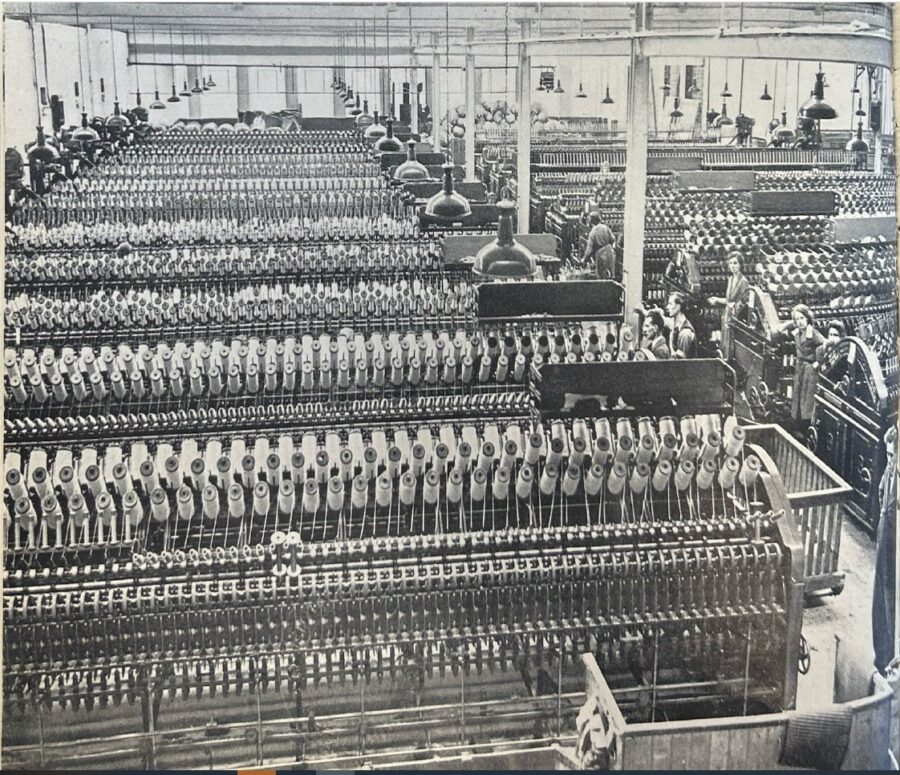
Kieran’s Our City, Our Town Article,
Cork Independent, 14 November 2024
Making an Irish Free State City – Further Growth for Sunbeam Wolsey
By the end of 1934 the Sunbeam Wolsey Partnership was doing well economically and striving into its future plans. The newly formed Company had been trading officially since the January 1934, with the benefit of the agreement with Wolsey Limited, Leicester, UK. The core Director, William Dwyer was concentrating on the development and manufacture of a complete range of hosiery and knitwear products. The Irish Press newspaper records on 7 December 1934 that new plant machinery from Germany had been installed for the manufacture of silk stockings and was capable of producing stockings of all types for the Irish market. The Company now employed a staff of nearly 600 as compared with 150 in December 1932.
For the year ended 30 June 1934, the trade exceeded the combined trade of Sunbeam Knitwear, Limited, and the Irish Free State trade of Wolsey Limited by approximately 25% as compared with the previous year. For the period from 1 July 1934 to 31 October 1934. the total trade of the Company showed a still further increase, being approximately 50 per cent greater than that of the corresponding period in 1933. The growth continued right throughout 1935 and 1936.
On 26 August 1936, the Irish Independent outlined the profits accrued in the Sunbeam Wolsey annual report, but also the core challenge of staff pay facing the Company. In particular William Dwyer outlined that there was an absence of a standard rate of pay for operatives in the industry. He drew on the returns of the Department of Industry and Commerce that cast a focus on the general conditions existing in the hosiery trade. There were three thousand workers in the trade, who were employed by sixty-live manufacturers. Six hundred of these were employed by Sunbeam Wolsey. The average pay of the workers in the sixty-four other factories was £40 per annum. The average earning of Sunbeam Wolsey was £60 per annum.
William Dwyer noted of the pay and the associated challenge of keeping it: “We pay 50 per cent, more than the average wage. The extra cost to us is £14,000 a year. Because of the number of factories, which have now started, the competition, which we are up against is practically altogether internal. That we can meet this competition and still pay 50 per cent higher wages to our workers is a clear at proof that our organisation is on the soundest possible basis”.
On 18 August 1937, A jump of over £8,400 in trading profits was shown in the report of Sunbeam Wolsey – the year ended for 30 June 1937 was £28,260 compared with £19,789 in June 1936.
The eleventh Ordinary General meeting of Sunbeam Wolsey, Limited, was held on 28 August 1939. Here, William Dwyer spoke about having bought outright the factory premises at Blackpool and having just completed the purchase of a new warehouse in Dublin.
William also reflected on the effects of the London Agreement or the ceasing of the Economic War with the UK on the hosiery manufacturing trade in the Irish Free State. He outlined that the duty on wool socks and stockings had been reduced, in some cases by two-thirds, and the duty on underwear had been likewise heavily reduced. Imports of wool hose had risen by approximately 80,000 dozens and of wool underwear by approximately 6,000 dozens, representing increases of over 200 per cent and 40 per cent respectively.
William noted on the increased productivity; “I think that the comparison between our figures and imports this year goes conclusively to prove our claim that we produce goods equal in value and finish to any English goods. The demand for our fully fashioned silk hosiery has made it necessary for as nearly to double our plant. Some of our new machines are now in production and the full plant should be running within two months”.
A year later at the twelfth Ordinary General Meeting of Sunbeam Wolsey Limited on 30 August 1940, William delivered his annual report in the context of the Second World War emerging. When the war broke out the Directors decided that every order on the Company’s books would be executed at the price at which the goods were sold to customers. It was planned that every endeavour was to be utilised to sell the products of the Company at a reasonable price as possible. William on this decision noted; “Even though costs of raw materials were soaring daily and advantage could easily had been taken for large price increases, we feel that the trade in general have appreciated this fact and that during the past year the goodwill of the trade to the Company has increased more than ever before”.
William continued his report commenting on the reduced overhead charges; “All the finished goods in your factory have already been sold for delivery within the next couple of months. Our stocks have been valued in the most conservative way possible. The prices of our goods to-day are very much lower than the price of similar goods sold in England. This is due to the very considerable decrease in the percentage of our overhead charges”.
William also commented that during the 1939-1940 year a subsidiary company called the Cork Spinning Company had created. Its aim was to supply practically all the requirements of the hosiery mill for worsted yarns at a very much lower price than that existing elsewhere. In addition to this the Cork Spinning Company installed a plant lor the throwing of pure silk. This branch of the business was started without any protective duties.
To be continued…
Caption:
1279a. Worsted spinning plant of fast-spinning reels and flying threads at Sunbeam Wolsey Ltd, Blackpool, 1942 (source: Cork City Library).